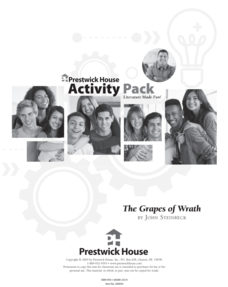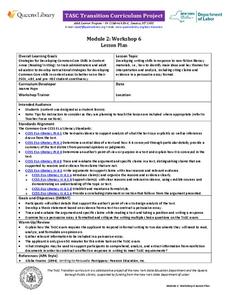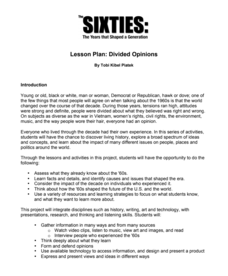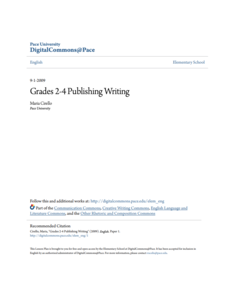Constitutional Rights Foundation
The Election of 1912
The Election of 1912: an election with four competitive opponents. Pupils get to know the candidates with informative reading passages that provide context to the election. Then, the class engages in a debate and answers questions as one...
Prestwick House
The Grapes of Wrath
At over 450 pages, John Steinbeck's Pulitzer Prize winning novel The Grapes of Wrath can be a challenging choice for full-class, book circle, or independent reading. The activities in a 10-page sample The Grapes of Wrath...
iCivics
Governing Communities
The government at the local level acts as perhaps one of the most relevant government systems to many in their communities. Learners discover how the local government shapes their lives and the similarities and differences between the...
Montana State University
Climb into Action!
Climate change affects even the largest and intimidating of landforms—even Mount Everest! A resource helps teach learners the connection between global climate change and its effects on Earth. Activities include videos, class discussion,...
Film Space
Whale Rider
Ready for an educational movie day? Use a resource based on the movie Whale Rider to learn more about the Maori culture. Class members answer a variety of questions and listen to music from the soundtrack to further analyze and...
University of Pennsylvania
Using Comic Strips to Teach Multiple Perspectives
Scholars view comics from two different perspectives; one paints the Alfred Dreyfus as innocent, while the other portrays the exact opposite. They solve the mystery of what happened by analyzing the source, working in groups, and...
The Holler
Conflict Resolution
Does your class understand the importance of peaceful conflict resolution? Middle schoolers share conflict stories, then collaborate to resolve simulated conflicts during an engaging activity. The teacher's guide contains implementation...
YMCA
Turning Courtrooms into Classrooms
Turn the class into the next episode of Law & Order! Scholars work together to create a mock trial over the course of several weeks before going before a judge for the case performance. They take on different roles, go through...
Curated OER
Martin Luther King and Malcom X on Violence and Integration
Dr. Martin Luther King and Malcolm X were contemporaries. Both were gifted orators, both were preachers, both were leaders during the Civil Rights era, both were assassinated. But the two had very different views on violence and...
EngageNY
TASC Transition Curriculum: Workshop 6
Is a college education necessary for success in today's world? The class investigates the question, along with others at the end of the sixth workshop in a 15-part series. The lesson has four parts with multiple activities and...
PBS
The Supreme Court: Define and Classify the Powers Associated with Federalism
Federalism may sound to some like one, big vocabulary word ... but it is much more than that. A short video introduces class members to the powers associated with the Supreme Court and its role in balancing the powers under federalism.
iCivics
Mini Lesson: Supreme Court Opinions
The court of last resort. Historians research, using current cases and issues, the impact the Supreme Court of the United States has on how our nation operates. They analyze recent decisions made by the nine judges and determine how the...
PBS
Lesson Plan: Divided Opinions
To gain a more in-depth understanding of the tumultuous 1960s, young historians examine video clips, listen to music, examine images, and interview survivors. Once they have a foundation of information about the period, class members...
PB Works
The Short Stories of Ernest Hemingway
There is more going on under the surface of Ernest Hemingway's work than one can glean in an initial reading. A literature resource compares the themes and structures of several of Hemingway's works before prompting class members to use...
Creative Learning Exchange
Lesson Plans From The Lorax
When it comes to the environment, no variable is constant. Class members graph behavior over time for the thneeds produced over truffula trees chopped down over the course of Dr. Seuss's The Lorax.
University of Iowa
Reading Racetrack Sight Word Activity
Vroom! Get your learners reading as fast as race cars with an engaging Dolch sight words. As class members read the assigned words, they move along a race track to mark their progress.
Historic New Orleans Collection
Exploring Primary Sources: Music in New Orleans
Looking for a new and exciting way to teach young historians the art of primary source analysis? Jazz up your lesson with a resource that asks class members to analyze photos, travel documents, and letters written by some of New Orleans'...
PBS
Ken Burns: Jackie Robinson - A Journey Back to Separate but Equal Conditions
Baseball great Jackie Robinson fought for social justice. His efforts to push for equal access are detailed in an episode from from the Ken Burns: The Jackie Robinson Collection. After viewing the clip, class members engage in a...
North Carolina Consortium for Middle East Studies
Using Drama to Address Social Justice Issues in School and the Community
Artists, musicians, and dramatists have long been the leaders in the quest for social justice. To gain an understanding of the power of the arts to address social issues, class members listen to a reading of Drew Daywalt's The Day the...
Howard Hughes Medical Institute
Lactose Intolerance: Fact or Fiction
Around the world, about 2/3 of adult humans are lactose intolerant. Scholars work in small groups to discuss a few statements about lactose intolerance. Then, they watch a video on the topic and readdress each statement. Whole-class...
Advocates for Human Rights
The Right to a Clean Environment: Right to a Clean Environment Role-Play
A lesson challenges scholars to think critically about the world in which they live. Learners begin by role-playing a character, answering questions, and taking part in a whole-class discussion. They then brainstorm ways they can help...
PBS
Analyzing McCulloch v. Maryland
What happened in the Supreme Court case of McCulloch v. Maryland? The resource teaches the specifics of the case with a video and provided discussion questions covering issues such as precedent and the Supreme Court as an equal branch of...
State of Victoria Department of Education and Early Childhood Development
The Long Wall of China
While some aspects of the Great Wall of China are known, other parts of its story are obscured by time. A research lesson asks scholars to consider what we know and don't understand about this wonder of the world. The class then compiles...
Pace University
Publishing Writing
Scholars become familiar with tagline literature with the help of the story, Alexander and the Horrible, No Good, Very Bad, Terrible Day by Judith Viort. After a read-aloud and whole-class discussion, leveled groups complete...
Other popular searches
- Taxonomy
- Classical Music
- Bloom's Taxonomy
- Using Taxonomy
- Blooms Taxonomy
- Technology in the Classroom
- Classifications
- Classroom Management
- Math Classification
- Animal Classifications
- Classifying Triangles
- Classify





















